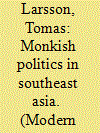| Srl | Item |
| 1 |
ID:
156729


|
|
|
|
|
| Summary/Abstract |
Democratization in a broad sense is a continuous process of sensitization and practice of given, rationalized, normative conditions to regulate relations among the state, society, and individuals. This may entail inculcation of ideas, values, and practices so that society and relationships are based on ideas of justice and equity. The recent phenomenon of democratization in the Middle East sheds interesting light on the process of democratization. Learning what factors triggered these processes is pertinent to understanding the nature and scope of an unfolding process. It is prudent to note that the ongoing democratization in this region is transitional and tentative at best, and there is a looming threat that the old power structure will superimpose itself again. There is a need to understand concepts of democracy from African, Arabic, and Indian contributions. This essay argues for the necessity for further research on the Arabic conception of state-society relations. This approach may unravel whether the social foundations in the region are conducive for democracy and shed light on the nature of traditional authority that has commanded loyalty from people over many centuries.
|
|
|
|
|
|
|
|
|
|
|
|
|
|
|
|
| 2 |
ID:
139665


|
|
|
|
|
| Summary/Abstract |
In the Theravāda Buddhist polities on the mainland of Southeast Asia, abiding concerns about the proper structuring of the relationship between the ‘two wheels of dhamma’ (i.e. the realm of religion and the realm of politics) have had a profound influence on processes of state formation and political legitimation. This article explores one such religious ‘effect’ on the constitutions and electoral laws of modern Burma/Myanmar, Siam/Thailand, Cambodia, and Laos, namely the official disenfranchisement of Buddhist monks (and, in some instances, Buddhist ‘nuns’ as well as non-Buddhist clergy). The article traces the historical evolution of this Buddhist exception to the democratic principle of equal and universal suffrage, and assesses the extent to which dominant theoretical approaches in the social sciences help us to understand the politics of religious disenfranchisement in Southeast Asia. It finds that neither secularization theory nor the religious-economy approach can explain observed patterns. Instead, the article offers an account of the politics of religious disenfranchisement that emphasizes the role of ideas and historical context.
|
|
|
|
|
|
|
|
|
|
|
|
|
|
|
|